Looking to take your bodybuilding to the next level? Discover how a Keto Bodybuilding Guide & Meal Plan can help you reach your fitness goals today!
Are you a bodybuilder looking to take your training and physique to the next level? The Keto Bodybuilding diet has been touted as a fast and effective way to get in shape and gain muscle mass. This blog will provide an all-encompassing guide for getting started on the keto diet, including tips on how to create an effective meal plan and information about essential elements such as protein, macronutrients, minerals, vitamins, hydration and more.
You’ll also learn the many benefits of combining keto with bodybuilding along with tips on how to monitor progress throughout your journey. Read on to discover the complete Keto Bodybuilding Guide & Meal Plan!
Key Takeaways
- A high-protein ketogenic diet consists of 60% fat, 35% protein, and 5% carbs.
- The keto diet is a high-fat, low-carb eating plan that leads to fast weight loss for some people.
- Subjects on the ketogenic diet ate close to 180 grams of protein per day whereas the high-carb group ate only 80 grams.
- The typical macronutrient ratio for the ketogenic diet is 60 to 75 percent of calories from fat.
- Moderate amounts of protein are consumed on the ketogenic diet.
- The Ketogenic Diet has been known to assist in repairing metabolic health.
- High-Protein Ketogenic Diets have been found to be effective for weight loss.
- The keto diet can reduce levels of inflammation in the body.
- Keto diets are also associated with improved blood sugar control.
What is Bodybuilding?
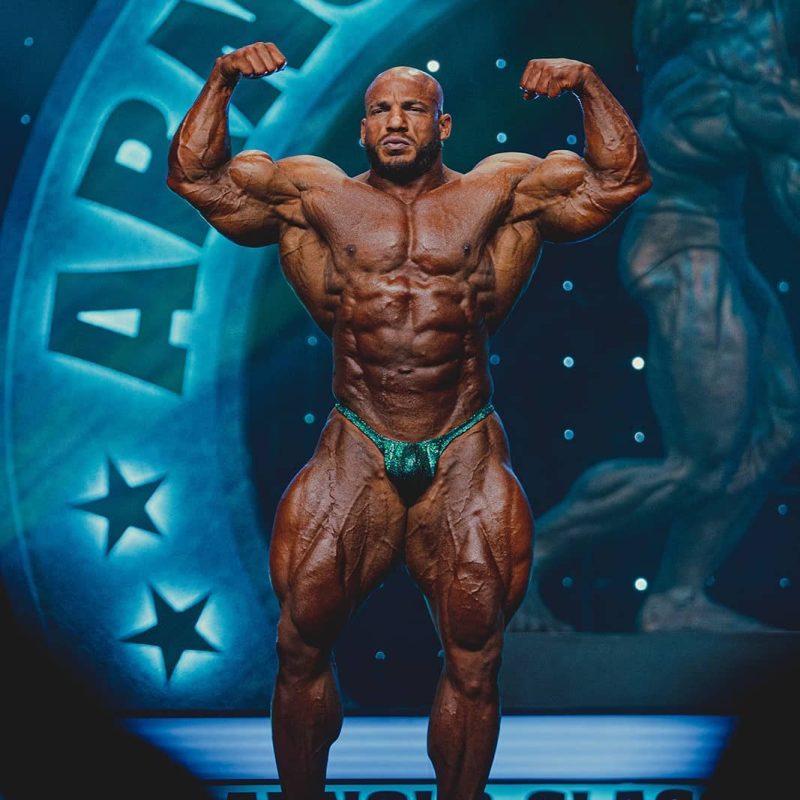
Bodybuilder Big Ramy
Bodybuilding is a form of physical exercise consisting of progressive resistance training to control and develop one’s physique. It focuses on building muscle mass and definition, with the goal of improving overall fitness and appearance.
Muscle growth is accomplished through intense workouts involving various compound exercises that promote an increase in muscle size, strength and endurance. Bodybuilders also follow restrictive diets to maximize their performance while decreasing body fat levels. To achieve these goals, bodybuilders must not only plan out their diet and routines but adhere to them throughout the entire process for maximum results.
What is The Keto Diet?
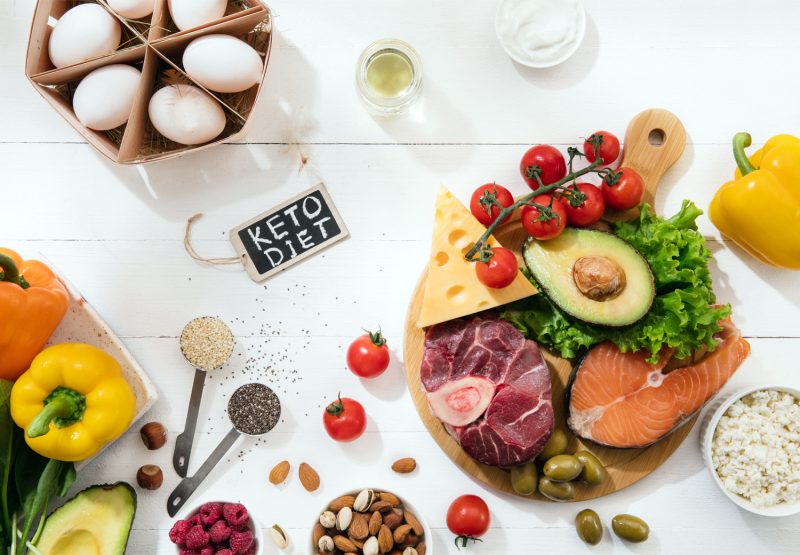
The keto diet is a high-fat, low-carb eating plan designed to promote weight loss. On the keto diet, around 60-75% of your daily intake should come from fat, while only 5-10% comes from carbs and 35% protein.
The aim is to enter into a state called ‘ketosis’, which helps to burn stored body fat for energy instead of relying on carbs. There are several types of ketogenic diets such as cyclical, targeted and standard – each with their own set of macronutrients and rules.
Studies have found that following a strict ketogenic diet can lead to rapid weight loss and improved blood sugar control. As well as providing multiple health benefits such as reducing inflammation levels in the body, it can also help you repair metabolic health over time.
Benefits Of Keto Bodybuilding
Keto Bodybuilding offers a range of potential benefits, including weight loss, increased muscle growth, improved energy levels, and heightened mental focus.
Weight Loss
Weight loss is a common goal on the ketogenic diet. The high-fat content of the keto diet helps to reduce hunger, minimize cravings, and keeps you fuller for longer – making it easier to stay in a calorie deficit.
Additionally, studies have shown that when following a ketogenic diet, people can burn up to 3 times more stored body fat than those who follow lower-fat diets. Furthermore, research also shows that following a keto diet increases metabolic stress which leads to increased fat breakdown and subsequent weight loss.
Increased Muscle Growth
Keto bodybuilding is becoming increasingly popular as a way to build muscle and lose fat simultaneously. Studies show that eating a high-fat, low-carb ketogenic diet has been found to stimulate muscle growth more effectively than a standard high-carb diet.
This is due to the higher protein intake, which helps increase levels of essential amino acids for muscle protein synthesis. In addition, ketone bodies can also be used during exercise, providing an additional energy source for muscles.
An adequate amount of dietary fat helps maintain lean body mass while reducing stored body fat; this allows our bodies to conserve energy while preserving lean muscle mass and aiding in gaining or maintaining strength. Furthermore, muscular endurance may be increased when following a keto diet plan since blood sugar remains stable throughout the day and glycogen stores are better managed.
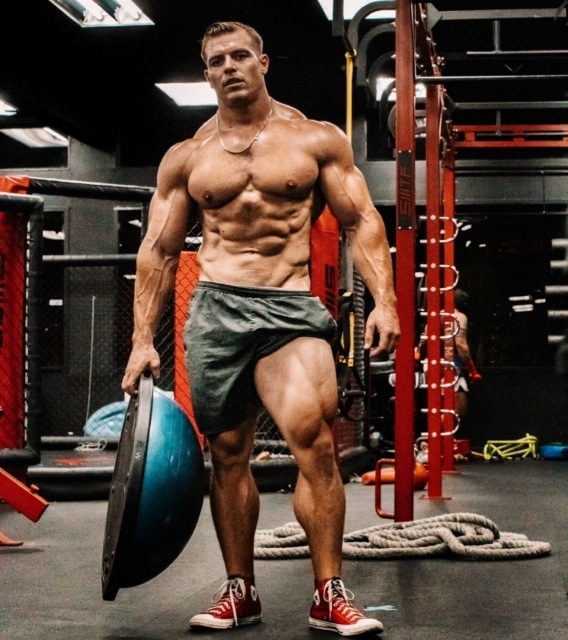
Brad Castleberry
Improved Energy
The ketogenic diet can be effective in boosting energy levels due to its high-fat, low-carb approach to eating. The dietary fats provide a slow release of energy for your body and keep you energized throughout the day.
Additionally, reducing carbohydrates helps reduce spikes in blood sugar which can lead to an increase in fatigue. Another benefit of the ketogenic diet is that it stimulates fat burning which also increases energy levels as stored body fat is being converted into fuel for your muscles and cells. This increased level of metabolism can help give you more sustained energy throughout the day and make workouts feel less strenuous.
Increased Mental Focus
Those following a Keto Bodybuilding plan may experience increased mental focus, concentration and clarity. This is due to the improved nutritional balance which facilitates better blood sugar control, reduced inflammation and more stable energy levels throughout the day.
Research shows that keto diets help reduce brain fog associated with other restrictive diets by providing enough fuel in the form of dietary fats for the brain to remain clear and alert all day long. Alongside high-quality proteins, going low carb on a ketogenic diet can be beneficial for improving overall cognitive function while helping bodybuilders reach their goals faster thanks to more effective workouts.
Essential Elements Of A Keto Meal Plan
Incorporating the right balance of protein, macronutrients, dietary fats, vitamins and minerals into your Keto Meal Plan is essential for successful bodybuilding. Read on to learn more about how to create an effective Keto Bodybuilding Plan!
Protein
Protein plays a very important role when it comes to the keto diet and bodybuilding. Consuming adequate amounts of protein, along with healthy dietary fats, is essential for optimal muscle growth.
Protein helps stimulate muscle protein synthesis, which is essential in building lean muscle mass and maintaining glycogen stores. Studies have shown that consuming more than 180 grams of protein per day on a ketogenic diet may help increase overall muscle growth as well as preserve muscle mass during periods of caloric deficit or fasting.
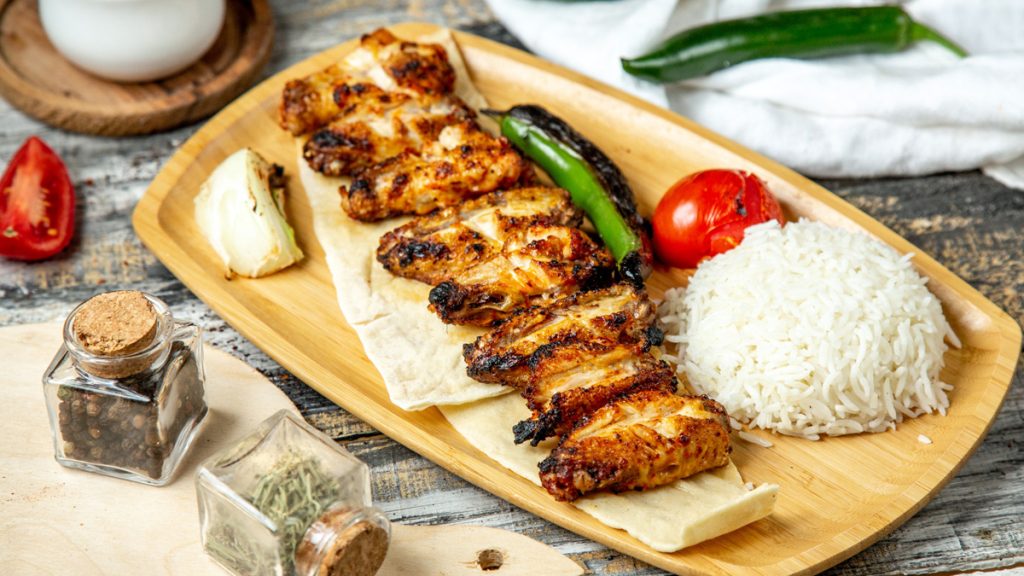
Chicken And Rice Diet
Macronutrients
Macronutrients are essential for bodybuilding and the keto diet requires different macronutrient ratios than a conventional diet. Macronutrients on a keto diet consist of 60-75 percent of calories from fat, 20-35 percent of calories from protein, and 5-10 percent of calories from carbs.
Adequate intake of dietary fats is necessary to provide fuel for the body’s cells and muscles; meanwhile, proteins help to repair muscle tissue after intense physical activity or training—while also maintaining lean muscle mass at rest times. Eating enough healthy proteins as part of a balanced ketogenic meal plan will ensure that your body has all the amino acids it needs to sustain normal metabolism and stimulate muscle growth.
Healthy Dietary Fats
Healthy dietary fats are essential to bodybuilding success when following a keto diet. Healthy sources of fat such as olive oil, avocados, nuts, and fatty fish help to provide the body with energy while simultaneously promoting muscle growth and repair.
Additionally, healthy fats can put you into a state of ketosis—where your body is burning stored fat as fuel instead of carbohydrates—faster than just carbohydrates alone would. This makes them an ideal source of fuel for those on a ketogenic diet looking to optimize their weight loss plan or gain lean muscle mass.
Adequate Minerals And Vitamins
Adequate minerals and vitamins are essential components of the keto bodybuilding meal plan. Without them, muscle growth will be hindered and overall health could suffer.
To ensure adequate vitamin intake, consider adding leafy greens such as spinach and kale to your diet or supplementing with a multivitamin. For minerals, magnesium is particularly important for maintaining energy levels while calcium plays a key role in bone health.
Quality sources of both can be found in nuts and seeds or through supplementation when necessary. Additionally, electrolytes like sodium and potassium should also be monitored while on the keto diet to ensure that they don’t become deficient due to reduced carbohydrate consumption.
Hydration
It is essential to remain hydrated while following a keto diet, as it can prevent fatigue and dehydration that can set in when on a low-carb diet. While on the ketogenic diet, drinking at least 64 ounces of water per day is recommended for optimal results.
Additionally, sports drinks containing electrolytes help to replenish lost minerals from sweat during exercise or daily activities due to the high fat content of the ketogenic diet. Replenishing electrolyte levels helps improve performance and aids in muscle recovery post-workout. Proper hydration also helps to keep your body functioning optimally and increases metabolism, which further supports fat loss goals for those trying to lean out with a keto bodybuilding plan.
How To Create A Keto Bodybuilding Plan
By understanding your macros, creating the right meal plan, and using the right supplements, you can make the most out of a keto bodybuilding diet. Read on to learn more about how to start your own keto bodybuilding journey!
Determining Your Macronutrients
Determining your macronutrients on a Keto Bodybuilding diet is essential. 60-75% of calories should come from fat, 15-35% from protein and the remaining 5-10% from carbohydrates.
The ketogenic diet requires measurably higher levels of dietary fat compared to high carb diets. It’s important to ensure you’re getting enough healthy fats in your meal plan, such as avocados, olive oil, fatty fish like salmon, nuts and seeds.
Protein intake should be moderate on the keto diet; anywhere between 0.8 and 1 gram of protein per pound of body weight is recommended for most people. Lastly, carbs should be reduced significantly with no more than 50 grams per day coming primarily from leafy greens and low glycemic fruit sources. Monitoring your macronutrient ratios can help you stay within ketosis for optimal results when using the keto diet for bodybuilding goals.
Creating A Meal Plan
Creating a meal plan for Keto bodybuilding is essential to help you reach your fitness goals. First, determine the number of calories and macronutrients needed to fuel your workouts.
Next, select proteins that are rich in essential amino acids and healthy fatty foods high in omega-3s. Finally, be sure to include adequate minerals and vitamins while also factoring in hydration needs.
A typical ketogenic diet consists of 60 percent fat, 35 percent protein, and 5 percent carbs as per . Additionally, according to, the keto diet is known for fast weight loss depending on how strictly it is followed. Also keep in mind that suggests that when following a strict ketogenic diet due diligence should be taken with blood ketone levels tracking them regularly to ensure adherence to the macros set out for your particular goal.
Choosing The Right Supplements
With the keto diet, it is important to make sure you are getting enough vitamins and minerals since they may be lacking in a very strict low-carb regimen. Adding supplements such as whey protein powders and essential fatty acids can help enhance muscle growth while still staying in nutritional ketosis.
Additionally, electrolyte supplementation can also help prevent dehydration as well as the “keto flu” symptoms that many people experience when starting out on the diet. Supplements such as omega-3s, vitamin D, calcium, magnesium, selenium and iron can help ensure that your body is getting the nutrients it needs even when sticking with a low-carb lifestyle.
Incorporating Exercise
Incorporating exercise into a keto bodybuilding plan is essential for the best results. Exercise helps to stimulate muscle growth and maintain muscle mass, improve energy levels, and burn fat.
Resistance training is especially beneficial when combined with the ketogenic diet as it helps increase strength and build muscle faster than traditional weight loss programs. Strength-training sessions should be done two to three times a week along with aerobic activity such as walking or jogging.
Regular physical activity also boosts metabolism and can help build lean muscle mass while preserving existing muscles. Additionally, exercises like high-intensity interval training (HIIT) can help burn more calories in less time, leading to faster fat loss on the keto diet.
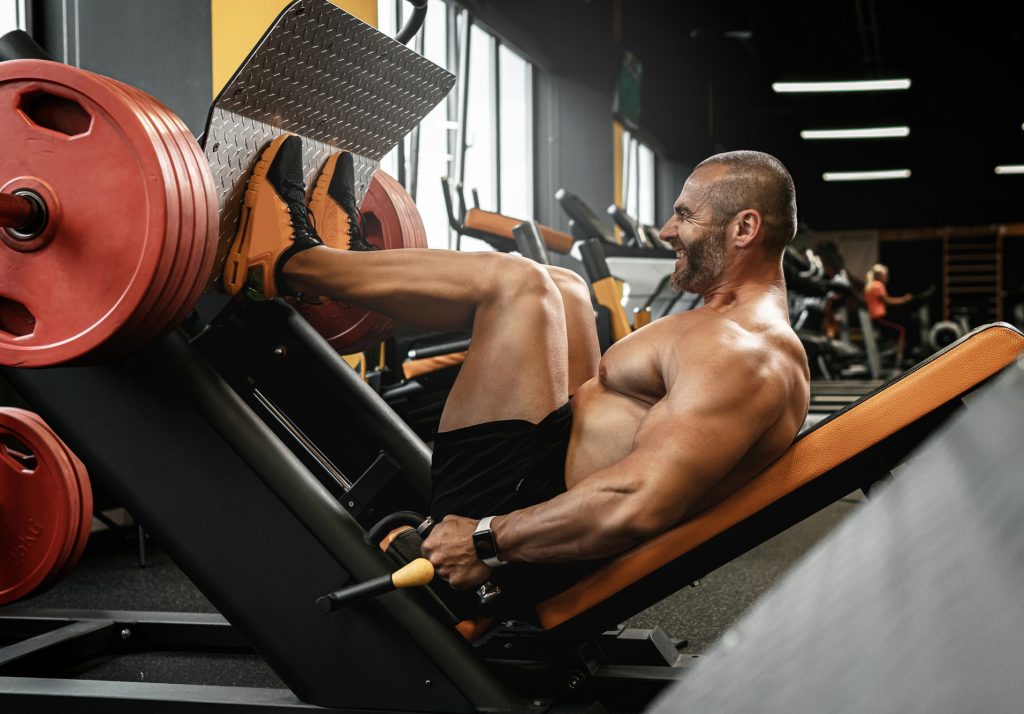
Monitoring Your Progress
Monitoring your progress on the keto bodybuilding plan is key to seeing results. Regularly tracking your weight, food intake and exercise habits will help you understand what works for you so that you can make necessary adjustments as needed.
Additionally, always check in with a medical professional when starting out to ensure that any changes are beneficial to your overall health goals. Keeping an eye on how much protein and essential fatty acids you’re consuming, as well as how much muscle growth has occurred over time, will help ensure that the efforts being made are working in favor of achieving desired results.
Getting Adequate Sleep
Adequate sleep is essential for any successful bodybuilding routine, regardless of whether it’s based on the keto diet or not. Studies have shown that insufficient sleep can lead to an increase in appetite, cravings for unhealthy foods, decreased muscle mass and impaired muscle recovery.
It’s important to get at least 7-9 hours of quality sleep each night while following the ketogenic diet – anything less could put a strain on your ability to gain lean muscle mass and burn fat efficiently. Additionally, sleeping too much has been correlated with weight gain which is counterproductive when trying to reach goals such as becoming leaner or developing more muscular strength. However, if you are willing to commit yourself and practice healthy sleeping habits then the benefits of taking time for adequate rest will be seen over time.
Tracking Your Food Intake
On a Keto bodybuilding plan, tracking your food intake is essential to reach your goals. Keeping track of calories and macronutrients consumed help you make sure that you are consuming the right balance of carbs, proteins, and fats.
This will allow you to adjust your meals accordingly so that there is enough protein and healthy dietary fats for muscle growth while still adhering to the principles of ketogenic dieting. Additionally, tracking can also reveal any nutritional deficiencies in your diet which can be addressed by making changes or supplementing with key nutrients. All of this data helps provide an overall snapshot of how well users are doing on their Keto Bodybuilding Diet Plan and provides insight into potential areas for improvement.
FAQs:
1. What is the keto bodybuilding diet?
The keto bodybuilding diet is a specialized type of low-carb, high fat eating plan designed to help individuals build muscle mass while stripping away excess fat. It typically involves reducing carbohydrates and increasing dietary fats in order to keep the body in a state of ketosis where it burns primarily stored fats as fuel instead of glucose from carbs.
2. How can I customize my meal plan for optimal results?
When following a keto meal plan specifically designed for muscle growth, you want to make sure that your macronutrient ratios (fats vs carbs vs proteins) are specific to your activity level, hormone levels and genetics. Additionally, tracking your daily macros on an app or by hand will help ensure that you’re consistently meeting nutritional requirements set forth by your program in order for progress towards goals remain at its optimum level over time.
3. Are there any supplements that should be taken when following this type of diet?
yes, certain supplements such as exogenous ketones, MCT oil and electrolytes are recommended during periods when engaging in intense physical activities such as weightlifting which require increased energy output from the body across extended amounts of time – which could be depleted faster than usual due to higher levels of fat burning during workouts then seen with traditional nutrition plans based around carbs & protein intake only .
4. What advice do people have after having experienced success with the Keto Bodybuilding Guide & Meal Plan?
Those who have experienced positive results when using this guide often suggest preparation is key since ensuring meals are planned ahead saves both time & money while making it easier stick with dietary restrictions necessary throughout each week – preparing snacks like deviled eggs w/ bacon also helps since they’re quick/easy yet still provide adequate amounts nutrient dense ingredients like omega-3s or magnesium required boost performance levels during exercise sessions later into day.
Conclusion
Keto bodybuilding is an effective way to build muscle, burn fat, and improve your overall health. By following the essential elements outlined in this guide – protein, macronutrients, healthy dietary fats, minerals and vitamins, hydration and exercise – you can create a personalized plan that helps you reach your goals while maintaining good nutrition. With adequate calories and enough protein to stimulate muscle growth as well as sufficient restful sleep for recovery each night, success with keto bodybuilding is attainable.